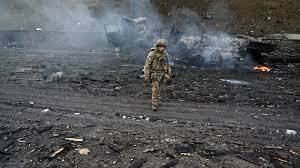On restraint – Anton Troianovski and Julian E. Barnes in NYT:
‘Russia’s war against Ukraine has leveled cities, killed tens of thousands of people and forced millions of others from their homes.
But quietly, some military analysts and Western officials are asking why the onslaught has not been even worse.
Russia could be going after Ukrainian railways, roads and bridges more aggressively to try to stanch the flow of Western weapons to the front line. It could have bombed more of the infrastructure around the capital, Kyiv, to make it harder for Western leaders to visit President Volodymyr Zelensky in shows of unity and resolve. And it could be doing far more to inflict pain on the West, whether by cyberattack, sabotage or more cutoffs of energy exports to Europe.
Part of the reason appears to be sheer incompetence: The opening weeks of the war demonstrated vividly that Russia’s military was far less capable than believed before the invasion. But American and European officials also say that President Vladimir V. Putin’s tactics in recent weeks have appeared to be remarkably cautious, marked by a slow-moving offensive in eastern Ukraine, a restrained approach to taking out Ukrainian infrastructure and an avoidance of actions that could escalate the conflict with NATO.’
(…)
‘Why isn’t Russia bombing more bridges and railway networks, he asked, when they are allowing Ukraine’s military to receive more of the West’s increasingly lethal weapons deliveries with every passing day? Why are Western leaders — like House Speaker Nancy Pelosi on Sunday — still able to visit Kyiv safely?
“I find this strange, and I can’t explain it,” Mr. Trenin said.
To be sure, Russian missile strikes have targeted infrastructure across Ukraine, including an important bridge in the country’s southwest on Monday and the runway of the Odesa airport on Saturday. But across the Atlantic, officials and analysts are asking themselves similar questions as Mr. Trenin.
For weeks, officials in Washington have discussed why the Russian military has not been more aggressive in trying to destroy the supply lines that send Western arms shipments into Ukraine. Part of the answer, officials say, is that Ukrainian air defense continues to threaten Russian aircraft, and the deeper Russian planes go into Ukraine the greater the chance they are going to be shot down.’
(…)
‘Then there is the question of why Russia hasn’t hit back harder against the West. The Kremlin narrative is of an existential war with NATO being fought on Ukrainian soil, but Russia is the one taking military losses while the West keeps a safe distance and supplies weapons that kill Russian soldiers.
“A lot of people in this town are asking why they haven’t retaliated yet,” said Samuel Charap, a former U.S. State Department official in Washington and a Russia analyst with the RAND Corporation. “It seems low probability that the U.S. and its allies will experience no blowback from having put this many Russian soldiers in their graves.”
Russia has the tools to do widespread damage to the West. The gas shortages caused by the cyberattack on the Colonial Pipeline last year showed the disruption that Russian hacking can inflict on American infrastructure. Berlin has warned that a cutoff of Russian gas could throw the German economy into a recession.
And then there is Moscow’s world-leading nuclear arsenal, with an estimated 5,977 warheads: Their catastrophic capability is being hyped in ever-shriller terms in the Russian media.’
(…)
‘American and allied officials have debated why Mr. Putin hasn’t tried widespread or more damaging cyberstrikes. Some say that Mr. Putin has been effectively deterred. The Russian military, struggling to make gains in Ukraine, cannot handle a wider war with NATO and does not want to give the alliance any excuse to enter the war more directly.
Others argue that a cyberstrike on a NATO country is one of the few cards Mr. Putin can play and that he may be waiting for a later stage in his campaign to do that.
While Mr. Putin has been unafraid of escalating the rhetoric, his actions have suggested he does not want to do anything that could prompt a wider war.’
Read the article here.
Good question. If the war is as serious as some Russian and other outlets want us to believe why could Pelosi visit Kiev? And why could the leader of the German opposition, Merz, travel by night train to Kiev?
Because Russia and the West are talking more to each other than is acknowledged and Putin has no interest at all in killing Merz or Pelosi i.e. in an all-out war.
For now, the war is in a holding pattern, because this is apparently in Putin’s interest, and regardless all the civilian deaths also the West can live very well with it.
The low-intensity war suits the major players.
